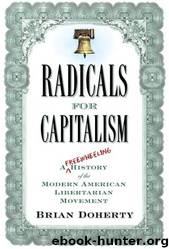Radicals for Capitalism by Brian Doherty

Author:Brian Doherty [Doherty, Brian]
Language: eng
Format: epub
Published: 0101-01-01T00:00:00+00:00
“BELIEVING WE’D BE ABLE TO ... ENGINEER A LIBERTARIAN REVOLT WITHOUT MASSIVE EXTERNAL BACKING WAS VERY NAIVE.”
Not everyone in the movement was thrilled with the arrival and rise of the LP. To this day, some blame it for bringing the disparate and multileveled energy of the post—New York Times Sunday magazine cover days to a dull, bureaucratic, in–fighting halt. Louis Rossetto called the party the “booby prize” that the movement won for all the attention and progress and growth of the early 1970s. Freelance libertarian philosopher George Smith, an old–fashioned “voting is a crime” libertarian (voting, after all, means participating in and implicitly agreeing to the outcome of a political game whereby other people’s lives and property are considered up for grabs) was disgusted by what he saw as extreme cynicism on the part of friends who became LP insiders. One old friend of his, an LP advocate until after the 1980 Ed Clark presidential campaign, told Smith that the LP represented no opportunity costs to the libertarian movement, since most of the party rank and file were so unintellectual and otherwise unskilled in the social change game that if they weren’t out on street corners petitioning for ballot access, they wouldn’t have anything to contribute to the movement.16
The LP’s most sincere, loudest, and most tenacious enemy was an anarchist science fiction fan named Sam Konkin, who styled himself the true center and conscience of the movement. For him, said one old friend, the libertarian split from YAF in St. Louis in 1969 was Luther nailing the theses to the church door and the light of revelation entering through a crack in the phenomenal universe all in one; the beginning of true revolution and the quintessence of all things. Konkin joined the New York branch of the LP in 1973 as a spoiler. From then on he raged against “partyarchy”17 and the corruption of his pure market anarchism with the stain of party politics.
Throughout the 1970s, Konkin was the most thorough chronicler of the movement’s ups and downs with his New Libertarian Notes, a newsletter of philosophical controversies, reviews of science fiction magazines, and non–party–centered discussion of the world of libertarian gatherings, supper clubs, books, and magazines. He issued it weekly for a few years in the mid–1970s, then sporadically in the 1980s and 1990s, usually under subtly shifting names, all with the words “New Libertarian” in there somewhere.
To him, the heart and soul of libertarianism (he called his variant “agorism” after agora, the Greek word for market) was the thousands of libertarians he knew were out there participating in “countereconomics,” creating institutions and markets hidden from the eyes of authorities and tax collectors—indulging in unregulated businesses that paid no taxes. These black free marketeers, he asserted, not those running for office with the LP or issuing ameliorist policy papers from the libertarian think tanks that arose later, or writing milquetoast journalism about municipal privatization from Reason, were what the libertarian movement was really all about.“18
Konkin’s agorism was a more
Download
This site does not store any files on its server. We only index and link to content provided by other sites. Please contact the content providers to delete copyright contents if any and email us, we'll remove relevant links or contents immediately.
The Secret History by Donna Tartt(16753)
The Social Justice Warrior Handbook by Lisa De Pasquale(11514)
Thirteen Reasons Why by Jay Asher(7853)
This Is How You Lose Her by Junot Diaz(5839)
Weapons of Math Destruction by Cathy O'Neil(5093)
Zero to One by Peter Thiel(4880)
The Myth of the Strong Leader by Archie Brown(4816)
Promise Me, Dad by Joe Biden(4489)
Beartown by Fredrik Backman(4482)
How Democracies Die by Steven Levitsky & Daniel Ziblatt(4462)
Stone's Rules by Roger Stone(4449)
The Fire Next Time by James Baldwin(4391)
100 Deadly Skills by Clint Emerson(4122)
A Higher Loyalty: Truth, Lies, and Leadership by James Comey(4071)
Rise and Kill First by Ronen Bergman(4059)
The David Icke Guide to the Global Conspiracy (and how to end it) by David Icke(3929)
The Farm by Tom Rob Smith(3903)
Secrecy World by Jake Bernstein(3820)
The Doomsday Machine by Daniel Ellsberg(3768)
